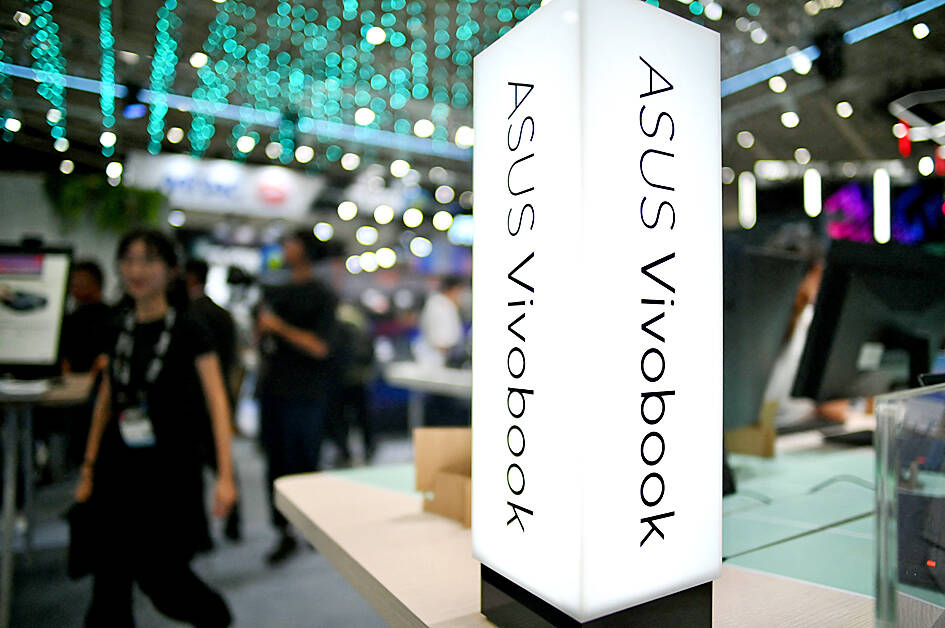Asustek Computer Inc (華碩電腦) plans to introduce one of the first services that lets companies tap into the potential of generative artificial intelligence (AI) while keeping control over their data.
The novelty of the Taipei-based firm’s offering, called AFS Appliance, is that all of the hardware would be installed in the client’s own facilities — to maintain security and control.
The AI computational platform, built on Nvidia’s chip technology, would be operated and updated with new data by Asustek.

Photo: Sam Yeh, AFP
A major concern around services such as OpenAI is that they are operated through online data centers that can expose sensitive information. Samsung Electronics Co banned employees from using OpenAI’s ChatGPT after it found workers had uploaded sensitive code to the platform.
Asustek is to preload the AFS hardware with its own large language model, called Formosa, which it says is equivalent to ChatGPT 3.5 and trained in traditional Chinese.
The company aims to price the service at about US$6,000 per month, Asus Cloud Corp (華碩雲端) and Taiwan Web Service Corp (台智雲) president Peter Wu (吳漢章) said in an interview on Monday.
The highest-spec offering, which adds an Nvidia DGX AI supercomputer platform, would cost about US$10,000 a month, he said.
Wu aims to have 30 to 50 enterprise customers in Taiwan and expand internationally by the end of this year.
“Nvidia is a partner with us to accelerate the enterprise adoption of this technology,” Wu said. “Before ChatGPT, the enterprises were not aware of why they need so much computing power.”
Most businesses would deploy generative AI on their own premises due to sensitivity about access to their proprietary data, Wu said.
“They need a smart brain to be under their own control and management, as it will touch on the most sensitive data,” he said.
Recently returning from a trip to Singapore, Wu says he sees a lot of interest from banks and hospitals. In the clinical context, generative AI would help doctors document treatments and patients visits quicker, while also helping communicate diagnoses in more relatable language to patients.
There is no supply shortage of Nvidia’s A100 chips, which run the AFS Appliance, Wu said, and the existing partnership between the companies is helping ensure that Asustek would have all the firepower it needs to roll out its new offering.

CHIP WAR: Tariffs on Taiwanese chips would prompt companies to move their factories, but not necessarily to the US, unleashing a ‘global cross-sector tariff war’ US President Donald Trump would “shoot himself in the foot” if he follows through on his recent pledge to impose higher tariffs on Taiwanese and other foreign semiconductors entering the US, analysts said. Trump’s plans to raise tariffs on chips manufactured in Taiwan to as high as 100 percent would backfire, macroeconomist Henry Wu (吳嘉隆) said. He would “shoot himself in the foot,” Wu said on Saturday, as such economic measures would lead Taiwanese chip suppliers to pass on additional costs to their US clients and consumers, and ultimately cause another wave of inflation. Trump has claimed that Taiwan took up to

A start-up in Mexico is trying to help get a handle on one coastal city’s plastic waste problem by converting it into gasoline, diesel and other fuels. With less than 10 percent of the world’s plastics being recycled, Petgas’ idea is that rather than letting discarded plastic become waste, it can become productive again as fuel. Petgas developed a machine in the port city of Boca del Rio that uses pyrolysis, a thermodynamic process that heats plastics in the absence of oxygen, breaking it down to produce gasoline, diesel, kerosene, paraffin and coke. Petgas chief technology officer Carlos Parraguirre Diaz said that in

Japan intends to closely monitor the impact on its currency of US President Donald Trump’s new tariffs and is worried about the international fallout from the trade imposts, Japanese Minister of Finance Katsunobu Kato said. “We need to carefully see how the exchange rate and other factors will be affected and what form US monetary policy will take in the future,” Kato said yesterday in an interview with Fuji Television. Japan is very concerned about how the tariffs might impact the global economy, he added. Kato spoke as nations and firms brace for potential repercussions after Trump unleashed the first salvo of

SUBSIDIES: The nominee for commerce secretary indicated the Trump administration wants to put its stamp on the plan, but not unravel it entirely US President Donald Trump’s pick to lead the agency in charge of a US$52 billion semiconductor subsidy program declined to give it unqualified support, raising questions about the disbursement of funds to companies like Intel Corp and Taiwan Semiconductor Manufacturing Co (台積電). “I can’t say that I can honor something I haven’t read,” Howard Lutnick, Trump’s nominee for commerce secretary, said of the binding CHIPS and Science Act awards in a confirmation hearing on Wednesday. “To the extent monies have been disbursed, I would commit to rigorously enforcing documents that have been signed by those companies to make sure we get